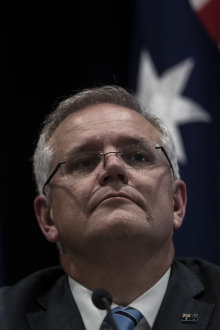As well, cruises ships from foreign ports will be banned for at least 30 days and the government will formally adopt a ban recommended on Friday on non-essential, static, mass gatherings of more than 500 people.

The Morrison government has announced a $17.6 billion coronavirus stimulus package, but will it be enough. Getty
Limitations on the size of gatherings in enclosed areas such as cinemas are likely to be made on Tuesday, as will restrictions on access to aged care facilities. It is understood a limit of 100 people is being contemplated for enclosed gatherings.
The new social distancing provisions also mean an end to shaking hands although this will not be illegal.
“No more handshakes,” Mr Morrison said. He added the Cabinet would be enforcing the discipline as well as meeting more frequently by phone-hook-up.
Mr Morrison urged people to help by exhibiting common sense. He said governments could not police every aspect of people’s lives.
As of Sunday, there were 279 known cases of coronavirus in Australia but the government and medical authorities believe this is about to escalate significantly. A 77-year-old Queensland woman died on Friday night taking the Australian death toll to four.
Medical modelling released Sunday by Mr Morrison shows that if the virus was allowed to run rampant without any quarantine or other containment measures, between 230,000 and 300,000 people could contract the disease in a single day at the height of the crisis.
Mr Morrison said the measures announced on Sunday, in conjunction with those already announced and those to come, were about what is known as flattening the peak, or flattening the curve.
Under this strategy, the outbreak will last longer than if measures were not in place but the spike any one time would be less severe. There will be fewer cases at any one time so the health system can cope better and deaths can be minimised.
Under the estimates released by Mr Morrison, with all the quarantine and other protection measures in place, about 40,000 to 80,000 could still present in a day at the peak of the crisis.
“We will be able to ensure we can provide the services and support particularly to the most vulnerable Australians,” Mr Morrison said.
“Slowing the spread, you free up the bed.
“Our aim in all of this is to protect the most vulnerable, the most at risk.”
Mr Morrison said there would be more changes in the future and he left open the possibility of schools being closed. At this stage, however, that was considered impractical and unnecessary.
Chief Medical Officer Brendan Murphy said he did not want to move too early on something like that because of the risk of taking parents out of the workforce to look after their children, particularly if they are in the health and medical sector.
With the crisis sending the world into turmoil, Mr Morrison threw his support behind a push by his British and Indian counterparts, Boris Johnson and Narendra Modi, for the G20 to hold a teleconference in a better co-ordinated global response.
Treasurer Josh Frydenberg also started contacting his G20 counterparts on Sunday night to discuss a similar hook-up of finance ministers.
Mr Morrison said when Parliament sat next week to pass legislation enacting the stimulus measures, it will be a minimalist affair, with the public banned and even the number of MPs scaled back.
In his own live address to the nation on Sunday night, Opposition leader Anthony Albanese criticised the government’s response.
“More can be done and should be done,” he said.
He called for more consistent advice such as when to self-isolate and when to get tested, getting more people tested more quickly, fast-tracking the establishment of 100 promised pop-up clinics, expanding Medicare to allow people to call or Skype their GP and “a serious reduction in large gatherings of people”
“There is now no room for delays,” he said.
“We want to see the Government get this right – because of people’s lives and jobs.”
Mr Morrison said more restrictions were to come.
“We’re going to have to get used to some more changes in the way we live our lives over the next six months or so, there will be further intrusions,” he said.
“There will be further restrictions on people’s movement and their behaviour.
“But the point is, you do it in a timely way. You do it in a managed way. You do it in a careful way.
“Just because something is not necessary today doesn’t mean it won’t be necessary in three weeks from now or three months from now, just as something we’re announcing today wasn’t necessary two months ago.”
The forced isolation of overseas arrivals follows the same move by New Zealand announced on Saturday. Mr Morrison spoke to his New Zealand counterpart Jacinda Ardern the same day.
More than 150,000 people have been infected with coronavirus worldwide, with more than 5600 deaths.
Amid criticism of a lack of reliable, consistent and simple information, the government rolled out a long-awaited campaign on Sunday
It urges people to wash their hands frequently, cover coughs and sneezes, and dispose of tissues, and avoid contact with others if they’re feeling unwell.
“Australia has one of the best health systems in the world with some of the most dedicated and experienced health professionals,” the letter reads.
“Containing the spread of an infection like COVID-19 comes down to every Australian playing their part by looking after their own hygiene, looking out for each other, and staying informed.”
People are also being urged only to be tested for the illness if they are experiencing cold or flu-like symptoms and have recently returned from overseas, or have been in contact with a confirmed case.




